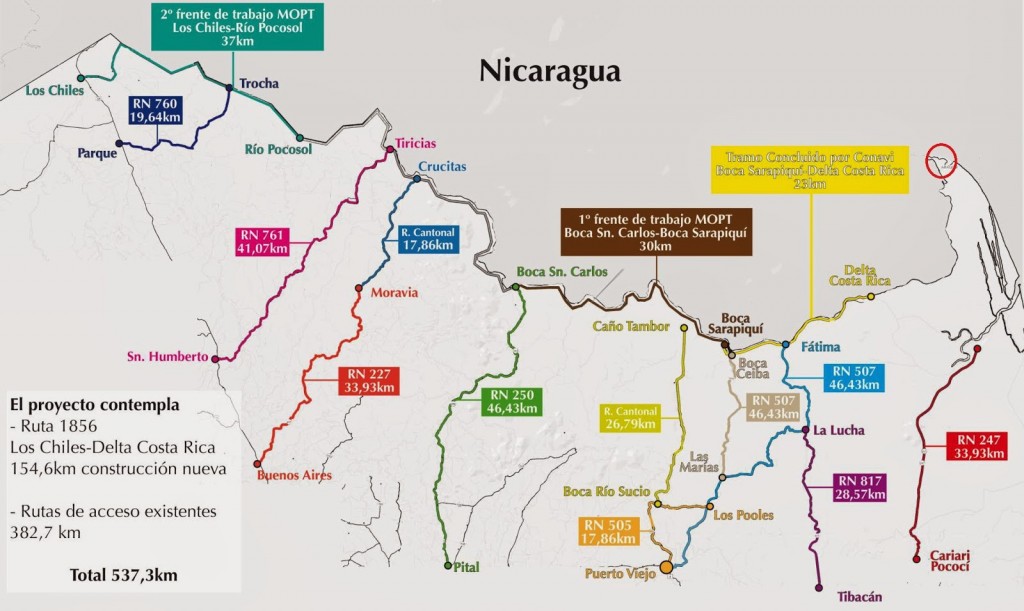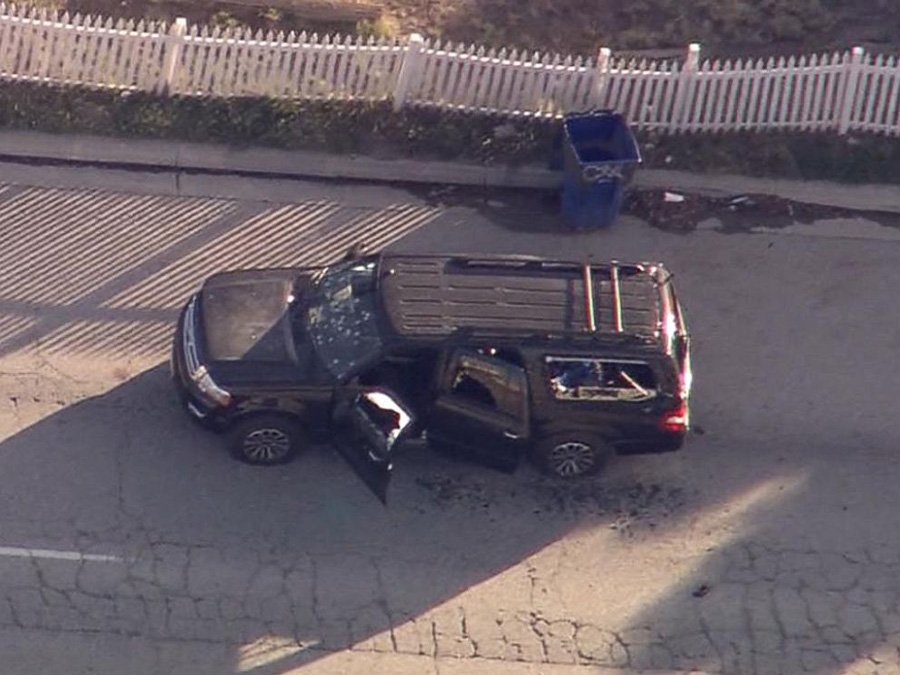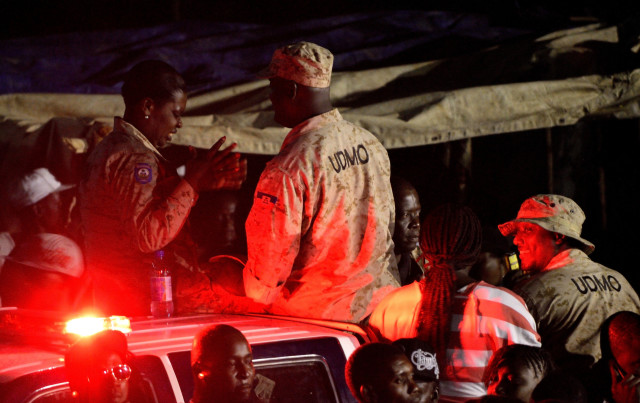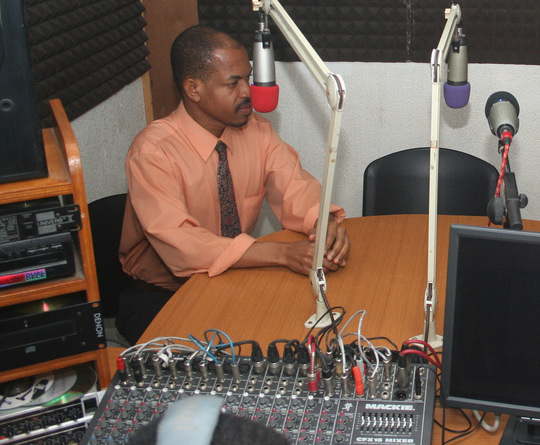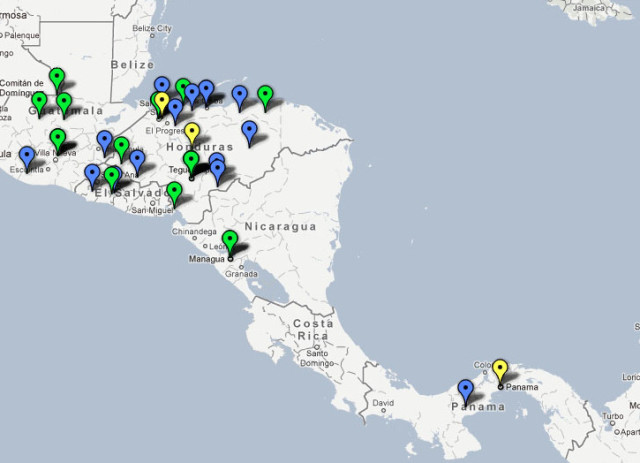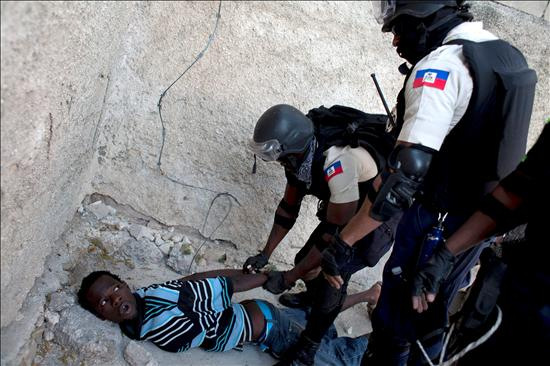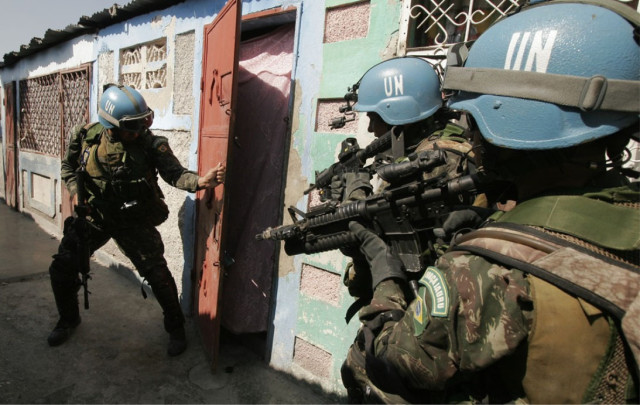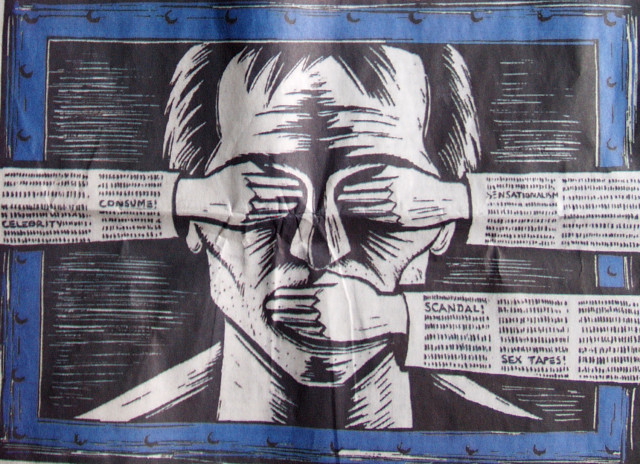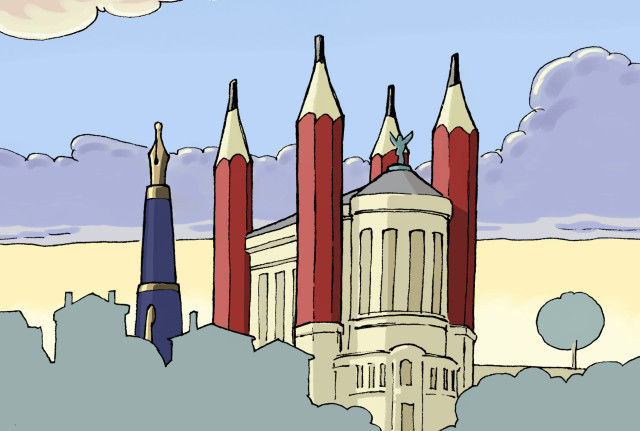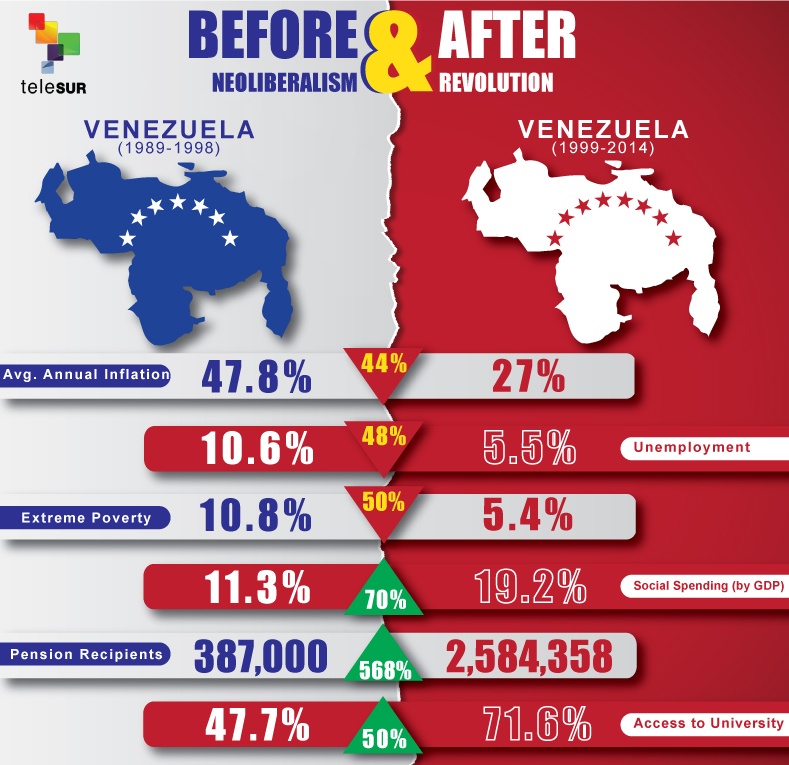-
↵1 See, generally, Whomersley, ‘Some Reflections on the Immunity of Individuals for Official Acts’, 41 ICLQ (1992) 848; Tomonori, ‘The Individual as Beneficiary of State Immunity: Problems of the Attribution of Ultra Vires Conduct’, 29 Denver J Int’l L and Policy (2001) 261; H. Fox, The Law of State Immunity (2nd edn, 2008), at 455–464 and Ch. 19; Watts, ‘The Legal Position in International Law of Heads of States, Heads of Governments and Foreign Ministers’, 247 Recueil des Cours(1994-III) 13; Wickremasinghe, ‘Immunities Enjoyed by Officials of States and International Organizations’, in M. Evans (ed.), International Law (3rd edn, 2010), at 380.
-
↵2 Akande, ‘International Law Immunities and the International Criminal Court’, 98 AJIL (2004) 407, 409–415.
-
↵3 See Watts, supra note 1.
-
↵4 E.g., Arts 29 and 31 Vienna Convention on Diplomatic Relations 1961 (VCDR), 500 UNTS 95; Art. IV, Section 11, Convention on the Privileges and Immunities of the United Nations 1946, 1 UNTS 15 and 90 UNTS 327 (corrigendum to vol. I).
-
↵5 Arts 21, 39, and 31 UN Convention on Special Missions 1969, 1400 UNTS 231.
-
↵6 See Wickremasinghe, supra note 1, at 406.
-
↵7 See Tunks, ‘Diplomats or Defendants? Defining the Future of Head-of-State Immunity’, 52 Duke LJ (2002) 651, at 656: ‘Head-of-State immunity allows a nation’s leader to engage in his official duties, including travel to foreign countries, without fearing arrest, detention, or other treatment inconsistent with his role as the head of a sovereign State. Without the guarantee that they will not be subjected to trial in foreign courts, heads of State may simply choose to stay at home rather than assume the risks of engaging in international diplomacy’. The same may be said of others entitled to immunity ratione personae. In 2010, Gordon Brown, then prime minister of the UK, expressed a similar concern: ‘[t]here is already growing reason to believe that some people are not prepared to travel to this country for fear that such a private arrest warrant – motivated purely by political gesture – might be sought against them. These are sometimes people representing countries and interests with which the UK must engage if we are not only to defend our national interest but maintain and extend an influence for good across the globe’: ‘Britain must protect foreign leaders from private arrest warrants’, The Guardian, 3 Mar. 2010.
-
↵8 United States Diplomatic and Consular Staff in Tehran case (United States of America v. Iran) [1980] ICJ Rep 3, at para. 91.
-
↵9 See Arrest Warrant of 11 April 2000 (Democratic Republic of Congo v. Belgium) [2002] ICJ Rep 3, Joint Separate Opinion of Judges Higgins, Kooijmans, and Buergenthal, ibid., at para. 75: ‘immunities are granted to high State officials to guarantee the proper functioning of the network of mutual inter-State relations, which is of paramount importance for a well-ordered and harmonious international system’. See also Fox, supra note 1, at 673.
-
↵10 Arrest Warrant case, supra note 9, at para. 54; Fox, supra note 1, at 694. See also the treaty provisions cited supra at note 5.
-
↵11 Arrest Warrant case, supra note 9, at paras 54–55.
-
↵12 Ibid., at paras 55, 70–71; Case Concerning Certain Questions of Mutual Assistance in Criminal Matters (Djibouti v. France), ICJ judgment of 4 June 2008, at para. 170, available at: www.icj-cij.org/docket/files/136/14550.pdf.
-
↵13 Arrest Warrant case, supra note 9, at para. 55.
-
↵14 Ibid., at para. 58.
-
↵15 See, generally, A. Cassese, International Criminal Law (2nd edn, 2008), at 309–310; Gaeta, ‘Official Capacities and Immunities’, in A. Cassese et al. (eds), Commentary on the International Criminal Court(2002), at 975, 983–989; Zappalà, ‘Do Heads of State in Office Enjoy Immunity from Jurisdiction for International Crimes? The Ghaddafi Case before the French Cour de Cassation’, 12 EJIL (2001) 595; Fox, ‘The Resolution of the Institute of International Law on the Immunities of Heads of State and Government’, 51 ICLQ (2002) 119.
-
↵16 See the Ghaddafi case, Arrêt no. 1414 (2001), 125 ILR 456 (France: Cour de Cassation); Castro case (Spain: Audiencia Nacional, 1999), cited by Cassese, supra note 15, at 272 n. 20; Re Sharon and Yaron, 42 ILM (2003) 596 (Belgium: Cour de Cassation); R. v. Bow Street Stipendiary Magistrate and others, Ex parte Pinochet (No.3) [1999] 2 All ER 97, at 126–127, 149, 179, 189 (HL, per Lords Goff, Hope, Millett, and Phillips); Plaintiffs A, B, C, D, E, F v. Jiang Zemin, 282 F Supp 2d 875 (ND Ill., 2003); Tachiona v. Mugabe, 169 F Supp 2d 259 (SDNY 2001). In Jan. 2004, an English District Judge rejected, on grounds of immunity, an application for a warrant for the arrest of Robert Mugabe, Head of State of Zimbabwe, in relation to allegations of torture. In 2008, Spain’s Audencia Nacional concluded that the Spanish courts did not have jurisdiction to prosecute President Kagame of Rwanda for the crime of genocide, crimes against humanity, and terrorist activities:Auto del Juzgado Central de Instucción No. 4 (2008), 151–157. Likewise, in Feb. 2004, a District Judge at Bow Street Magistrates’ Court rejected, on grounds of immunity, an application for a warrant for the arrest of General Mofaz, then Israeli Minister of Defence, in relation to allegations of breaches of war crimes: see Warbrick, ‘Immunity and International Crimes in English Law’, 53 ICLQ (2004) 769. In 2009, Ehud Barak, Israeli Minister of Defence was the subject of an application for an arrest warrant for war crimes committed in Gaza in Dec. 2008. This application was also denied: see Black and Cobain, ‘Barak faces war crimes arrest threat during UK visit’, The Guardian, 29 Sept. 2009.
-
↵17 The US government issued a suggestion of immunity in a case brought against the then President of China alleging torture, genocide, and other human rights violations. See Murphy, ‘Head-of-State Immunity for Former Chinese President Jiang Zemin’ in ‘Contemporary Practice of the United States Relating to International Law’, 97 AJIL(2003) 962, at 974–977; Plaintiffs A, B, C, D, E, F, supra note 16. In Aug. 2003, Saied Baghban, an Iranian diplomat accused of having been involved in the bombing of a Jewish centre in Argentina, was briefly detained in Belgium but then released on grounds of diplomatic immunity: see Beeston, ‘Iran threatens to hit back over diplomat’s arrest’, The Times, 28 Aug. 2003, at 17. Similarly, despite accusations that the Israeli Ambassador to Denmark had been complicit in torture while he was head of Shin Bet, the Israeli Intelligence Service, Denmark has maintained that he is entitled to diplomatic immunity from Danish criminal jurisdiction. See Osborn, ‘Danish protests greet Israeli envoy’,The Guardian, 16 Aug. 2001, at 13; Hartmann, ‘The Gillon Affair’, 54ICLQ (2005) 745. Likewise, the authorities of the UK took the view that a serving Israeli Defence Minister was entitled to immunity from arrest despite allegations that he had been responsible for war crimes in the West Bank. See McGreal, ‘Sharon’s Ally Safe from Arrest in Britain’, The Guardian, 11 Feb. 2004, at 19.
-
↵18 117 F 3d 1206 (11th Cir. 1997).
-
↵19 See Djibouti v. France, supra note 12, at para. 170.
-
↵20 See Arrest Warrant case, supra note 9, at para. 51; Watts, supranote 1; Arts 1, 2, and 15 Res of the Institut de Droit Internaitonal on ‘Immunities from Jurisdiction and Execution of Heads of State and of Government in International Law’, 2001, available at: www.idi-iil.org/idiE/resolutionsE/2001_van_02_en.PDF.
-
↵21 Arts 29 and 31 VCDR.
-
↵22 Arrest Warrant case, supra note 9, at para. 53.
-
↵23 Ibid. 53 (emphasis added).
-
↵24 Ibid.
-
↵25 In Application for Arrest Warrant Against General Shaul Mofaz(Decision of District Judge Pratt, Bow Street Magistrates’ Court, Feb. 2004), it was stated that ‘[t]he function of various Ministers will vary enormously depending upon their sphere of responsibility. I would think it very unlikely that ministerial appointments such as Home Secretary, Employment Minister, Environment Minister, Culture Media and Sports Minister would automatically acquire a label of State immunity. However, I do believe that the Defence Minister may be a different matter’: see Warbrick, supra note 16, at 773. However, in modern international affairs, it is difficult to see that the Ministers listed above would not be involved in travel on behalf of the state. However, some limits have been drawn. In Djibouti v. France, supranote 12, the ICJ confirmed that officials holding the (non-ministerial) posts of Public Prosecutor and Chief of National Security did not enjoy immunity ratione personae (at para. 194).
-
↵26 See Art. IV, para. 11, Convention on the Privileges and Immunities of the UN (1946), supra note 4; Art. V, General Convention on the Privileges and Immunities of the Organization of African Unity (1965), available at:www.dfa.gov.za/foreign/Multilateral/africa/treaties/oaupriv.htm.
-
↵27 See Arts 29 and 31 UN Convention on Special Missions 1969,supra note 5.
-
↵28 See USA v. Sissoko, 121 ILR 599 (SD Fla, 1997); Wickremasinghesupra note 1, at 391. See however Yearbook of the International Law Commission, Volume II (1967), 358 (‘It is now generally recognized that States are under an obligation to accord the facilities, privileges and immunities in question to special missions and their members.’).
-
↵29 See the suggestion of immunity issued by the US Executive Branch in Li Weixum v. Bo Xilai, DCC Civ. No. 04-0649 (RJL), available at: www.state.gov/documents/organization/98832.pdf. See also the statement of John Bellinger Legal Adviser, US State Department, available at: http://opiniojuris.org/2007/01/18/immunities/.
-
↵30 Li Weixum v. Bo Xilai, supra note 29.
-
↵31 Djibouti v. France, supra note 12, Memorial of the Republic of Djibouti, Mar. 2007, at paras 131–140, available at: www.icj-cij.org/docket/files/136/14390.pdf. Djibouti later amended its claim and declined to claim immunity ratione personae for persons other than the Head of State. In any event, the Court held that ‘the Convention on Special Missions of 1969 [was] not … applicable in this case’: ICJ judgment, supra note 12, at para. 194. This was probably no more than an indication that the facts did not fall within the scope of the Convention.
-
↵32 128 ILR (2005) 713. See also proceedings in England regarding Israeli Minister Ehud Barak, supra note 16; Written Ministerial Statement by Mr Henry Bellingham (Under-Secretary of State for Foreign Affairs), HC Deb., 13 Dec. 2010, Vol. 520, 72WS.
-
↵33 However, Germany did arrest her on a subsequent visit in Nov. of the same year arguing that she was in Germany on a private visit (a point disputed by Rwanda). See Akande, ‘Prosecution of Senior Rwandan Government Official in France: More on Immunity’ (2008), available at: www.ejiltalk.org/prosecution-of-senior-rwandan-government-official-in-france-more-on-immunity/. See also Thalmann, ‘French Justice’s Endeavours to Substitute for the ICTR’, 6 J Int’l Criminal Justice (2008) 995.
-
↵34 Decision of 27 Feb. 1984, Case No. 4 StR 396/83, 80 ILR (1989) 388 (Germany: Federal Supreme Ct).
-
↵35 See Arrest Warrant case, supra note 9, Counter-Memorial of the Kingdom of Belgium, 28 Sept. 2001, at paras 1.11–1.12, 3.2.32, available at: www.icj-cij.org/docket/files/121/8304.pdf.
-
↵36 See The Schooner Exchange v. McFaddon, 11 US 116 (1812) (US Sup. Ct.) Marshall CJ, holding that whenever a Sovereign, a representative of a foreign State or a foreign army is present within the territory by consent, it is to be implied that the local sovereign confers immunity from local jurisdiction.
-
↵37 Arrest Warrant case, supra note 9, at para. 55.
-
↵38 See Watts, supra note 1, at 102–109. There appears to be little practice, if any, suggesting that states consider the position of Foreign Ministers to be the same as that of Heads of State and Government.
-
↵39 See R. van Alebeek, The Immunity of States and Their Officials in International Criminal Law and International Human Rights Law (2008), at 179–180, making the same point with regard to Heads of State.
-
↵40 Ibid., at 180. See also Fox, supra note 1, at 673: ‘[t]he occasion of an official visit peculiarly celebrates the representation of the State in the person of the visiting head’.
-
↵41 See Watts, supra note 1, at 53, 102–103.
-
↵42 Military and Para-military Activities in and against Nicaragua (Nicaragua v. United States) [1986] ICJ Rep 14, at para. 202.
-
↵43 See R. Jennings and A. Watts (eds), Oppenheim’s International Law (9th edn, 1992), at para. 445: ‘the head of government … does not represent the international persona of the state in the same way in which the Head of State does’. See also Watts, supra note 1, at 102–103: ‘heads of government and foreign ministers, although senior and important figures, do not symbolize or personify their States in the way that Heads of State do. Accordingly, they do not enjoy in international law any entitlement to special treatment by virtue of qualities of sovereignty or majesty attaching to them personally.’
-
↵44 This is the approach set out by the Institut de droit international,supra note 20.
-
↵45 Fox, supra note 1, at 670 (n. 16) notes that in 1978 there were ‘68 States whose Heads were also Heads of Government’.
-
↵46 For relevant cases from different jurisdictions see Tomonori,supra note 1, at 269–273. For a consideration of US and UK law on the matter see Whomersley, supra note 1; Fox, supra note 1, at 458–459.
-
↵47 Wickremasinghe, supra note 1, at 383. See also Art. 39(2) VCDR,supra note 4, and the discussion infra in relation to former diplomats, and Art. 43(1) Vienna Convention on Consular Relations (1963) (VCCR), 596 UNTS 261, in relation to consular officials. Some have doubted whether the immunity ratione materiae applicable to former diplomats is of the same nature as the general immunity applicable to other official acts of other state officials: see, e.g., Dinstein, ‘Diplomatic Immunity from Jurisdiction Ratione Materiae’, 15 ICLQ (1966) 76, at 86–89, who argues that diplomatic immunity ratione materiae is broader than that accorded to other state officials. Tomonori, supra note 1, at 281, questions whether other state officials possess immunity ratione materiae in criminal proceedings and in relation to ultra vires acts.
-
↵48 See Van Panhuys, ‘In the Borderland Between the Act of State Doctrine and Questions of Jurisdictional Immunities’, 13 ICLQ (1964) 1193, at 1201. See also Twycross v. Dreyfus, 5 ChD (1877) 605 (England: CA); Kuwait Airways Corp. v. Iraq Airways Co. [1995] 3 All ER 694 (HL); Walker v. Bank of New York, 16 OR 3d 1994) 504 (Canada: Ontario CA) and s.14(2) UK State Immunity Act 1978, Ch. 33.
-
↵49 For the suggestion that the paucity of domestic criminal cases recognizing the ratione materiae immunity of states makes it difficult to prove that this type of immunity applies in criminal proceedings see Tomonori, supra note 1, at 262.
-
↵50 See Ipsen, ‘Combatants and Non-Combatants’, in D. Fleck (ed.),The Handbook of Humanitarian Law of Armed Conflict (2nd edn, 2008), at 79, 82.
-
↵51 The best-known case in which this type of immunity was asserted in respect of criminal proceedings is Macleod’s case (on which see Jennings, ‘The Caroline and McLeod Cases’, 32 AJIL (1938) 82, at 92); Noyes, ‘The Caroline: International Law Limits on Resort to Force’, in J. Noyes, L. Dickinson, and M. Janis, International Law Stories (2007), at 263. While both the British and US governments accepted that there was immunity under international law from both civil and criminal processes, Macleod was actually subject to trial owing to the inability of the US federal government to interfere with the prosecution. In Nov. 2007 a Paris District Prosecutor dismissed a complaint against Donald Rumsfeld, former US Secretary of State for Defence, alleging that he was responsible for acts of torture in detention centres in Guantanamo Bay and Abu Ghraib. The Prosecutor’s reason for dismissing the complaint was based on Rumsfeld’s continuing immunity ‘for acts performed in the exercise of his functions [as former Secretary of State for Defense].’ See www.fidh.org/france-in-violation-of-law-grants-donald-rumsfeld,4932. However, in the Rainbow Warrior Case, 74 ILR (1986) 241, the French government’s assertion that military officers should not be tried in New Zealand once France had accepted international responsibility was rejected by New Zealand. See also the few cases cited by Tomonori, supra note 1, at 262.
-
52 See Cassese, supra note 15, at 304; Fox, supra note 1, at 94–97. InAttorney General of Israel v. Eichmann, 36 ILR (1962) 5, at 308–309, the Israeli Supreme Court stated that ‘[t]he theory of “Act of State” means that the act performed by a person as an organ of the State – whether he was Head of the State or a responsible official acting on the Government’s order – must be regarded as an act of the State alone. It follows that only the latter bears responsibility therefor, and it also follows that another State has no right to punish the person who committed the act, save with the consent of the State whose mission he performed. Were it not so, the first State would be interfering in the internal affairs of the second, which is contrary to the conception of the equality of States based on their sovereignty.’ However, the Court was not prepared to accept that this theory applied in all cases. See also the correspondence in the MacLeod case, supra note 51.
In Jones v. Saudi Arabia [2006] UKHL 26, at para. 68, Lord Hoffmann argued that it is ‘artificial to say that acts of officials are not attributable to them personally and … this usage can lead to confusion, especially in those cases in which some aspect of the immunity of the individual is withdrawn by treaty, as it is for criminal proceedings by the Torture Convention’. However, he conceded that there was ‘undoubted authority’ for this view of functional immunity.
-
↵53 Prosecutor v. Blaškić (Objection to the Issue of Subpoena duces Tecum) IT-95-14-AR108 (1997), 110 ILR (1997) 607, at 707, para. 38.
-
↵54 See Brief for the United States of America as Amicus Curiae in Support of Affirmance (2007), Matar v. Dichter (2nd Cir. 2009): ’the Executive generally recognizes foreign officials to enjoy immunity from civil suit with respect to their official acts – even including, at least in some situations, where the state itself may lack immunity under the FSIA’.
-
↵55 See Wickremasinghe, supra note 1, at 396; Fox, supra note 1, at 455–463.
-
↵56 Zoernsch v. Waldock [1964] 1 WLR 675, at 692 (England: CA, perDiplock LJ). For similar statements see Chuidian v. Philippine National Bank, 912 F 2d 1095, 1101 (9th Cir. 1990): ‘it is generally recognized that a suit against an individual acting in his official capacity is the practical equivalent of a suit against the sovereign directly’; Restatement (Third) of the Foreign Relations Law of the United States (1986), at para. 66: ‘immunity of a foreign state … extends to … any other public minister, official or agent of the state with respect to acts performed in his official capacity if the effect of exercising jurisdiction would be to enforce a rule of law against the state’; and Propend Finance Pty Ltd v. Sing, 111 ILR (1997) 611, at 669 (England: CA).
-
↵57 Under Art. 53 Vienna Convention on the Law of Treaties (1969), 1155 UNTS 331, a peremptory norm of international law or jus cogensis ‘a norm accepted and recognized by the international community as a whole as a norm from which no derogation is permitted’.
-
↵58 This argument has generally been made in attempts to deny immunity in civil actions against states. See Bianchi, ‘Immunity Versus Human Rights: The Pinochet Case’, 10 EJIL (1999) 237, at 265: ‘human rights atrocities cannot be qualified as sovereign acts: international law cannot regard as sovereign those acts which are not merely a violation of it, but constitute an attack against its very foundation and predominant values’. See also Belsky, Merva, and Roht-Arriaza, ‘Implied Waiver Under the FSIA: A Proposed Exception to Immunity for Violations of Peremptory Norms of International Law’, 77 California LR (1989) 365, at 394: [t]he existence of a system of rules that states may not violate implies that when a state acts in violation of such a rule, the act is not recognized as a sovereign act. When a state act is no longer recognized as sovereign, the state is no longer entitled to invoke the defense of sovereign immunity’; Bianchi, ‘Denying State Immunity to Violators of Human Rights’, 46 Austrian J Public and Int’l L (1994) 195, at 205, 217; Reimann, ‘A Human Rights Exception to Sovereign Immunity: Some Thoughts on Prinz v. Federal Republic of Germany’, 16Michigan J Int’l L (1995) 403, at 421–423; Orakhelashvili, ‘State Immunity and International Public Order’, 43 German Yrbk Int’l L (2002) 227, at 237.
-
↵59 Belsky, Merva, and Roht-Arriaza, supra note 58, at 394.
-
↵60 Prefecture of Voiotia v. Federal Republic of Germany, [1997]Revue Hellénique De Droit International 595 (Greece: Court of First Instance Leivadia, 1997). See Bantekas, ‘Case Comment: Prefecture of Voiotia v. Federal Republic of Germany’, 92 AJIL (1998) 765.
-
↵61 Albeit that the Supreme Court qualified the argument by emphasizing that the acts had taken place on Greek territory:Prefecture of Voiotia v. Germany, Case no. 11/2000 (Greece: Supreme Court, 2000). See Vournas, ‘Prefecture of Voiotia v. Federal Republic Of Germany: Sovereign Immunity and the Exception for Jus CogensViolations’, 21 NY Law School J Int’l & Comp L (2002) 629; Gavouneli and Bantekas, ‘Prefecture of Voiotia v. Federal Republic of Germany’, 95AJIL (2001) 198.
-
↵62 Greek Citizens v. Federal Republic of Germany (The Distomo Massacre Case), 42 ILM (2003) 1030 (Germany: Sup. Ct, 2003), at 1033. The German Supreme Court noted both a judgment of the Special Supreme Court of Greece on a similar issue in which it was held ‘that according to the current state of international law there still exists a generally recognized international norm, which prohibits that a State be sued in another State for damages in relation to crimes which were committed on the territory of the forum state with the participation of troops of the defendant State in times of war as well as in times of peace’ (Margellos v. Federal Republic of Germany (Greece: Anotato Eidiko Dikasterio, 2002)) and the decision of the ECtHR in App. No. 50021/00, Kalegoropoulou v. Greece and Germany, 2002-IX ECtHR 415, which declared the same applicants’ claim inadmissible.
-
↵63 Federal Republic of Germany v. Miltiadis Margellos, Case 6/17-9-2002 (Greece: Special Supreme Court, 2002).
-
↵64 Prinz v. Federal Republic of Germany 26 F 3d 1166 (DC Cir. 1994).
-
↵65 Ibid., at 1174. Other US cases where this argument has been dismissed include: Smith v. Socialist People’s Libyan Arab Jamahiriya,101 F 3d 239 (CA, 2nd Cir., 1996); Persinger v. Islamic Republic of Iran, 90 ILR 486 (DC Cir. 1996); Sampson v. Federal Republic of Germany, 975 F Supp 1108 (ND Ill., 1997).
-
↵66 Ibid., at 1182.
-
↵67 Ferrini v. Repubblica Federale di Germania, 87 RDI (2004) 539 (Italy: Cassazione), at paras 7 and 8.2. See De Sena and de Vittor, ‘State Immunity and Human Rights: the Italian Supreme Court Decision on the Ferrini Case’, 16 EJIL (2005) 89, at 101–102; Focarelli, ‘Denying Foreign State Immunity for Commission of International Crimes: the Ferrini Decision’, 54 ICLQ (2005) 951, at 956–957. However, it should be noted that the Court did accept the normative hierarchy theory discussed infra.
-
↵68 Jones v. Saudi Arabia, supra note 52, at para. 62. See alsoArgentine Republic v. Amerada Hess Shipping Corporation, 488 US 428, 442–443 (1989) (US Sup. Ct).
-
↵69 See Lord Wilberforce in I Congresso del Partido [1981] 2 All ER 1064, at 1074 (HL): ‘in considering, under the restrictive theory, whether State immunity should be granted or not, the court must consider the whole context in which the claim against the State is made, with a view to deciding whether the relevant act(s) on which the claim is based should, in that context, be considered as fairly within an area of activity, trading or commercial or otherwise of a private law character, in which the State has chosen to engage or whether the relevant activity should be considered as having been done outside the area and within the sphere of governmental or sovereign activity’. See also Holland v. Lampen Wolfe [2000] 3 All ER 833 (HL), where Lord Hope stated that ‘it is the nature of the act that determines whether it is to be characterised as iure imperii or iure gestionis. The process of characterisation requires that the act must be considered in its context. In the present case the context is all-important. The overall context was that of the provision of educational services to military personnel and their families stationed on a US base overseas. The maintenance of the base itself was plainly a sovereign activity.’ For similar statements see also United States v. Public Service Alliance of Canada, 32 ILM (1993) 1 (Canada: Sup. Ct); Litterell v. USA (No. 2), 100 ILR (1995) 438 (England: CA); Egypt v. Gamal-Eldin [1996] 2 All ER237 (England: Employment Appeals Tribunal).
-
↵70 In Nelson v. Saudi Arabia, 100 ILR (1993) 544, at 553 the US Sup. Ct stated that ‘however monstrous such abuse undoubtedly may be, a foreign state’s exercise of the power of its police has long been understood for purposes of the restrictive theory as peculiarly sovereign in nature’. See also Claim against the Empire of Iran, 45 ILR (1963) 57, at 81 (West Germany: Federal Constitutional Court): ‘[i]n this generally recognisable field of sovereign activity are included transactions relating to foreign affairs and military authority, the legislature, the exercise of police authority, and the administration of justice’. See further Propend Finance Pty. Ltd and others v. Sing, supranote 56; Argentine Republic v. Amerada Hess, supra note 68; Paprocki v. German State, 104 ILR (1995) 684 (England: High Ct).
-
↵71 See McGregor, ‘Torture and State Immunity: Deflecting Impunity, Distorting Sovereignty’, 18 EJIL (2007) 903.
-
↵72 ‘The immunity, where it exists, is from the local jurisdiction and not from legal (or State) responsibility on the international plane. The issue is, in part at least, a question of the appropriate forum’ (emphasis in original): Brownlie, ‘Preliminary Report on the Contemporary Problems Concerning the Jurisdictional Immunity of States’, 62-IAnnuaire de L’Institut de Droit international (Cairo, 1987) 13, at 18. See also Fox, ‘International Law and Restraints on the Exercise of Jurisdiction by National Courts of States’, in M.D. Evans (ed.),International Law (3rd edn, 2010), 340, 351. See also Arrest Warrantcase, supra note 9, at para. 59.
-
↵73 Jones v. Saudi Arabia, supra note 52, at para. 12 (per Lord Bingham). See generally Fox, supra note 1, at ch. 13.
-
↵74 Art. 2(3)(a) and (b), Res of the Institut de Droit International on ‘Contemporary Problems Concerning the Immunity of States in Relation to Questions of Jurisdiction and Enforcement’ (1991) indicates that the fact that a particular case involves the adjudication of the validity or legality of the acts of the defendant state in terms of international law itself indicates the incompetence of the forum court in the matter. See 64-II Annuaire de L’institut de Droit international (Basle, 1991), 338, 393–394.
-
↵75 See Tunks, supra note 7, at 659–660; Tomonori, supra note 1, at 283 ff.
-
↵76 See Pinochet (No.3), supra note 16, at 113, 166 (per Lords Browne-Wilkinson and Hutton); R. v. Bow Street Stipendiary Magistrate and others, ex parte Pinochet (No.1) [1998] 4 All ER 897, at 939–940, 945–946 (HL, per Lords Nicholls and Steyn). It is amazing that these judges could have reached this conclusion in respect of torture, which under Art. 1 Convention Against Torture and Other Cruel, Inhuman or Degrading Treatment or Punishment (1984), 1465 UNTS 85 is limited to acts ‘of a public official or other person acting in an official capacity’ (emphasis added). See also the Joint Separate Opinion of Judges Higgins, Kooijmans, and Buergenthal in the Arrest Warrant case, supranote 9, at para. 85 and the Bouterse case, at para. 4.2 (Netherlands: Gerechtshof Amsterdam, 2000), cited in the Joint Separate Opinion above. A similar position has been taken in a number of US civil cases under the Alien Tort Claims Act. See, e.g., In re Estate of Ferdinand Marcos, 25 F 3d 1467, at 1469–1472 (9th Cir. 1994); Xuncax v. Gramajo, 886 F Supp 162, at 175 (D. Mass. 1995); Cabiri v. Assasie-Gyimah, 921 F Supp 1189, at 1197–1198 (SDNY 1996).
-
↵77 See Watts, supra note 1, at 56–57; Wirth, ‘Immunity for Core Crimes? The ICJ’s Judgment in the Congo v. Belgium Case’, 13 EJIL(2002) 877, at 891; Cassese, ‘When May Senior State Officials be Tried for International Crimes? Some Comments on the Congo v. BelgiumCase’, 13 EJIL (2002) 853, at 867–870.
-
↵78 Barker, ‘The Future of Former Head of State Immunity After Ex Parte Pinochet’, 48 ICLQ (1999) 937, at 943. Taking the same view are Denza, ‘Ex Parte Pinochet: Lacuna or Leap’, 48 ICLQ (1999) 949, at 952; Cassese, supra note 77, at 870 (who argues that it would be artificial to consider international crimes committed by senior state officials as private acts). See also the views of the Prosecutor dismissing a complaint seeking the prosecution in France of former US Defence Secretary, Donald Rumsfeld, for torture, discussed in Gallagher, ‘Universal Jurisdiction in Practice: Efforts to Hold Donald Rumsfeld and Other High Level United States Officials Accountable for Torture’, 7 J Int’l Criminal Justice (2009) 1087, at 1110–1111.
-
↵79 See Arts 4 and 7, International Law Commission’s Articles on the Responsibility of States for Internationally Wrongful Acts 2001, UN Doc. A/CN.4/L.602.
-
↵80 See Jones v. Saudi Arabia, supra note 52, at paras 74–78 (per Lord Hoffmann).
-
↵81 See Bianchi, supra note 58, at 265: ‘[a]s a matter of international law, there is no doubt that jus cogens norms, because of their higher status, must prevail over other international rules, including jurisdictional immunities’. See also Reimann, supra note 58, at 421–423; Byers, ‘Comment on Al-Adsani v. Kuwait’, 67 British Yrbk Int’l L(1996) 537, at 539–540; Orakhelashvili, ‘State Immunity in National and International Law: Three Recent Cases Before the European Court of Human Rights’, 15 Leiden J Int’l L (2002) 703, at 712–713; Orakhelashvili, ‘International Decisions: Arrest Warrant case’, 96 AJIL(2002) 677; Orakhelashvili, supra note 58, at 255 ff; Karagiannakis, ‘State Immunity and Fundamental Human Rights’, 11 Leiden J Int’l L(1998) 9; Orakhelashvili, ‘State Immunity and Hierarchy of Norms: Why the House of Lords Got it Wrong’, 18 EJIL (2007) 955, at 964: ‘[t]here is solid doctrinal support for the approach that jus cogens trumps state immunity before national court, and this has been the case throughout the whole period in which this issue has been arising in practice’.
-
↵82 Siderman de Blake v. Republic of Argentina, 965 F 2d 699, at 718 (CA 9th Cir. 1992). A similar argument was made and accepted inFerrini v. Federal Republic of Germany (2004), Cass sex un 5044/04; 87Rivista di diritto internazionale (2004) 539 (Italy: Cassazione);Prefecture of Voiotia v. Federal Republic of Germany (2000), Case No. 11/2000 (Greece: Court of Cassation); Lozano 91 Rivista di diritto internazionale (2008) 1223 (Italy: Cassazione); FRG v. Mantelli and others, Order No. 14201 (2008) (Italy: Cassazione); Milde (‘Civitella’), 92 Rivista di diritto internazionale (2009) 618 (Italy: Cassazione); and by six of the dissenting judges (Rozakis and Caflisch, joined by Wildhaber, Costa, Cabral Barreto, and Vajić) in App. No. 35763/97, Al-Adsani v. United Kingdom, 34 EHRR (2002) 11. In 2008, the rash of Italian judgments against Germany became the subject of proceedings before the ICJ when Germany initiated proceedings against Italy, claiming that ‘Italian judicial bodies have repeatedly disregarded the jurisdictional immunity of Germany as a foreign State’: Jurisdictional Immunities of the State (Germany v. Italy), press release no. 2008/44, 23 Dec. 2008, available at: www.icj-cij.org/docket/files/143/14925.pdf.
-
↵83 Prosecutor v. Kupreškić et al, IT-95-16 (ICTY: Trial Chamber, 2000), at para. 520. For similar assertions see Cassese, supra note 15, at 203. In the Nuclear Weapons Advisory Opinion (Request by General Assembly) [1996] ICJ Rep 226, the ICJ was evasive on this point. On the one hand, it stated (at para. 79) that ‘a great many rules of humanitarian law’ were ‘fundamental rules’ which ‘constitute intransgressible principles of international customary law’. However, the Court stated later in the same opinion (at para. 83) that while it had been argued that the rules and principles of humanitarian law were part of jus cogens, there was ‘no need for the Court to pronounce on this matter’.
-
↵84 See Nicaragua v. USA, supra note 42, at para. 190.
-
↵85 See Judge ad hoc Elihu Lauterpacht, in Application of the Convention on the Prevention and Punishment of the Crime of Genocide (Bosnia and Herzegovina v. Yugoslavia), Further Request for Provisional Measures, Order of 13 Sept. 1993 [1993] ICJ Rep 325, at 440.
-
↵86 See Prosecutor v. Furundžija, Judgment, Case No. IT-95-17/1-T (1998), 121 ILR 213, at 260 (ICTY: Trial Chamber), para. 153; Al-Adsani v. UK, supra note 82, at paras 60–61.
-
↵87 Belligerent reprisals are defined as ‘coercive measures which would normally be contrary to international law but which are taken in retaliation by one party to a conflict in order to stop the adversary from violating international law’. See Oeter, ‘Methods and Means of Combat’, in Fleck (ed.), supra note 50, at 232. See generally F. Kalshoven,Belligerent Reprisals (1971).
-
↵88 See Hampson, ‘Belligerent Reprisals and the 1977 Protocols to the Geneva Conventions 1949’, 37 ICLQ (1988) 818; Greenwood, ‘The Twilight of the Law of Belligerent Reprisals’, 20 Netherlands Yrbk Int’l L(1989) 35; Kalshoven, ‘Belligerent Reprisals Revisited’, 21 Netherlands Yrbk Int’l L (1990) 43.
-
↵89 For the view that Art. 51(6), Protocol Additional to the Geneva Conventions of 12 August 1949 (1977), 1125 UNTS 3, which prohibits reprisals against civilians, constitutes a rule of customary international law see Prosecutor v. Kupreškić, supra note 83, at paras 521–536; and Rule 146 ICRC Customary Study which provides that ‘Belligerent reprisals against persons protected by the Geneva Conventions are prohibited’: J. Henckaerts and L. Doswald-Beck, Customary International Humanitarian Law, Volume 1 (2005), at 519, especially at 520–523.
-
↵90 See Greenwood, supra note 88, at 63–64; Kalshoven, supra note 87, at 53; Oeter, supra note 87, at 206–207; R. Cryer et al., An Introduction to International Criminal Law and Procedure (2nd edn, 2010), at 421. See also Prosecutor v. Kupreškić, supra note 83, at 532–533. See UK Ministry of Defence, The Manual of the Law of Armed Conflict (2004), at 422–423.
-
↵91 This applies equally to the rules regarding diplomatic immunity.
-
↵92 See Fox, supra note 1, at 525: ‘[s]tate immunity is a procedural rule going to the jurisdiction of a national court. It does not go to substantive law; it does not contradict a prohibition contained in a jus cogens norm but merely diverts any breach of it to a different method of settlement. Arguably, then, there is no substantive content in the procedural plea of State immunity upon which a jus cogens mandate can bite.’ Lady Fox’s argument was cited with approval in Jones v. Saudi Arabia by both Lords Bingham and Hoffmann: see supra note 52, at paras 24 and 44. See also Voyiakis, ‘Access to Court v. State Immunity’, 52 ICLQ (2003) 297, at 321: ‘it is not all clear how the prohibition of torture and the law of State immunity could collide in the first place. To risk some triviality, the prohibition of torture seems mainly about prohibiting the practice of torture, whereas the rules of State immunity are mainly about the exercise of jurisdiction over foreign States.’
-
↵93 This argument was presented by Judge Al-Khasawneh in his dissenting opinion in the Arrest Warrant case, supra note 9, at para. 7.
-
↵94 Art. 49, First Geneva Convention (1949), 75 UNTS 31; Art. 50, Second Geneva Convention (1949), 75 UNTS 85; Art. 129, Third Geneva Convention (1949), 75 UNTS 135; Art. 146, Fourth Geneva Convention, (1949), 75 UNTS 287; Art. 85(1), First Additional Protocol to the 1949 Geneva Conventions (1977), supra note 89.
-
↵95 Art. 7, Convention Against Torture 1984, supra note 76.
-
↵96 See B. Broomhall, International Justice and the International Criminal Court: Between Sovereignty and the Rule of Law (2003), at 111–112; Meron, ‘International Criminalization of Internal Atrocities’, in T. Meron, War Crimes Law Comes of Age (1998), 228, at 249–256.
-
↵97 In Prosecutor v. Furundžija, Judgment, supra note 86, at para. 156, the ICTY held that ‘[a]t the individual level, that is, of criminal liability, it would seem that one of the consequences of the jus cogenscharacter bestowed by the international community upon the prohibition of torture is that every State is entitled to investigate, prosecute and punish or extradite individuals accused of torture, who are present in a territory under its jurisdiction. Indeed, it would be inconsistent on the one hand to prohibit torture to such an extent as to restrict the normally unfettered treaty-making power of sovereign States, and on the other hand bar States from prosecuting and punishing those torturers who have engaged in this odious practice abroad’ (emphasis added.) See also Pinochet (No. 3), supra note 16, at 109 (per Lord Browne-Wilkinson), 177 (per Lord Millett).
-
↵98 See dicta by the ICTY in Prosecutor v. Furundžija, supra note 86. The Committee Against Torture also made similar statements in its Concluding Comments on Canada, 7 July 2005, CAT/C/CR/34/CAN, at paras 4(g) and 5(f); Concluding Observations on Republic of Korea, 25 July 2006, CAT/C/KOR/CO/2, at para. 8(a); Concluding Observations on Japan, 3 Aug. 2007, CAT/C/JPN/CO/1, at para. 23; and Concluding Observations on New Zealand, 14 May 2009, at para. 14. See also Hall, ‘The Duty of States Parties to the Convention against Torture to Provide Procedures Permitting Victims to Recover Reparations for Torture Committed Abroad’, 18 EJIL (2007) 921. Reference may also be made to the limited practice of immunity being lifted in civil cases under the US Alien Tort Claims Act 1789, 28 USC § 1350.
-
↵99 See Jones v. Saudia Arabia, supra note 52, where it was held that there was ‘no adequate foundation in any international convention, State practice or scholarly consensus’ for such a practice (per Lord Bingham, at para. 34). In his judgment, Lord Hoffmann stated that for the claimants to succeed with this argument it was ‘necessary to show that the prohibition on torture has generated an ancillary procedural rule which, by way of exception to State immunity, entitles or perhaps requires States to assume civil jurisdiction over other States in cases in which torture is alleged’. See also Fox, supra note 1, at 525, andBouzari v. Iran (2002), 124 ILR 427 (Canada: Ontario Sup. Ct, approved on appeal 2004), at paras 43–56, holding that Art. 14(1) Torture Convention, supra note 76, which provides that states parties ‘shall ensure in its legal system that the victim of an act of torture obtains redress and has an enforceable right to fair and adequate compensation’, does not impose an obligation on parties to provide a civil remedy in respect of torture committed by another state.
-
↵100 See East Timor Case (Portugal v. Australia) [1995] ICJ Rep 90;Armed Activities on the Territory of the Congo (New Request, 2002)(Congo v. Rwanda), Jurisdiction and Admissibility [2006] ICJ Rep 6, at para. 64. For the argument that state immunity is based on the consent rule applicable to international tribunals see Crawford, ‘International Law and Foreign Sovereigns: Distinguishing Immune Transactions’, 53British Yrbk Int’l L (1983) 75, at 79–85.
-
↵101 See Prosecutor v. Furundzija, ICTY Trial Chamber, Dec. 1998, at para. 156: ‘it would seem that one of the consequences of the jus cogens character bestowed by the international community upon the prohibition of torture is that every State is entitled to investigate, prosecute and punish or extradite individuals accused of torture, who are present in a territory under its jurisdiction’. See A. Orakhelashvili,Peremptory Norms in International Law (2006), at 288–319 and 340–357: ‘[i]f jus cogens crimes are peremptorily outlawed as crimes, then the duty to prosecute or extradite their perpetrators must be viewed as peremptory’ (at 305) ‘under international law peremptory rules such as core norms of human rights law prevail over non-peremptory norms of immunities. Also in the case of international crimes outlawed under jus cogens, such as crimes against humanity, it must be accepted that the principles of immunity have no peremptory status and that the conflict between the two sets of norms must be resolved considering the framework of normative hierarchy giving primacy to the relevant peremptory norm’ (at 343).
-
↵102 See J. Crawford, The International Law Commission’s Articles on State Responsibility (2002), at 188 (para. 5 of commentary to Art. 26).
-
↵103 See Akande, ‘Prosecuting Aggression: The Consent Problem and the Security Council Issue’, Oxford ELAC Working Paper (May 2010), available at:www.elac.ox.ac.uk/downloads/dapo%20akande%20working%20paper%20may%202010.pdf. See also Res. RC/Res. 6 adopted at the Kampala Review Conference by states parties to the Statute of the International Criminal Court (June 2010), Annex III, ‘Understandings regarding the amendments to the Rome Statute of the International Criminal Court on the Crime of Aggression’, at para. 5: ‘[i]t is understood that the amendments [relating to aggression] shall not be interpreted as creating the right or obligation to exercise domestic jurisdiction with respect to an act of aggression committed by another State’.
-
↵104 ‘The aggression attributed to a State is a sine qua non for the responsibility of an individual for his participation in the crime of aggression. An individual cannot incur responsibility for this crime in the absence of aggression committed by a State. Thus, a court cannot determine the question of individual criminal responsibility for this crime without considering as a preliminary matter the question of aggression by a State. The determination by a national court of one State of the question of whether another State had committed aggression would be contrary to the fundamental principle of international law par in parent imperium non habet. Moreover, the exercise of jurisdiction by the national court of a State which entails consideration of the commission of aggression by another State would have serious implications for international relations and international peace and security’: Commentary to Art. 8, ILC Draft Code of Crimes Against the Peace and Security of Mankind, 1996, available at:http://untreaty.un.org/ilc/texts/instruments/english/commentaries/7_4_1996.pdf.
-
↵105 See the International Law Commission’s Commentary to Art. 26 of the Articles on the Responsibility of States, in Crawford, supra note 102, at 188, para. 5; Separate Opinion of Judge Ammoun, Barcelona Traction [1970] ICJ Rep 304; I. Brownlie, Principles of Public International Law (7th edn, 2008), at 511; and Cassese, supra note 15, at 203.
-
↵106 See Art. 41(2), ILC Articles on State Responsibility in Crawford,supra note 102.
-
↵107 ‘[T]he non-recognition of South Africa’s administration of the Territory should not result in depriving the people of Namibia of any advantages derived from international co-operation … the effects of which can be ignored only to the detriment of the inhabitants of the territory’: Legal Consequences for States of the Continued Presence of South African in Namibia (South West Africa) notwithstanding Security Council Resolution 276 (1970) [1971] ICJ Rep 16, at para. 125.
-
↵108 Al-Adsani v. United Kingdom, supra note 82, at para. 61. A similar conclusion was reached by the British Branch of the Human Rights Section of the International Law Association, ‘Report on Civil Actions in the English Courts for Serious Human Rights Violations Abroad’ [2001] European Human Rts L Rev 129.
-
↵109 See also App. No. 59021/00, Kalogeropoulou v. Greece & Germany, supra note 62; App. No. 14717.06, Grosz v. France,Admissibility Decision, 16 June 2009 (ECtHR).
-
↵110 Arrest Warrant case, supra note 9, at para. 58. Although note the dissenting opinions of Judges Al-Khasawneh and Van den Wyngaert, ibid., at 7 and 28 respectively.
-
↵111 While some support this view (see Black-Branch, ‘Sovereign Immunity Under International Law: The Case of Pinochet’, in D. Woodhouse (ed.), The Pinochet Case: A Legal and Constitutional Analysis (2000), 93, at 101; Pinochet (No. 3), supra note 18, at 149 (perLord Hope)), it is untenable since immunity ratione personae can always be waived or set aside by treaty. Indeed, it has been argued elsewhere that Art. 27 Rome Statute of the International Criminal Court (1998), 2187 UNTS 3, constitutes a treaty waiver of immunity ratione personae. See Akande, supra note 2, at 419–421.
-
↵112 Arrest Warrant case, supra note 9, at para. 61.
-
↵113 Ibid.
-
↵114 See Art. III(1), Resolution on the Immunity from Jurisdiction of the State and of Persons Who Act on Behalf of the State in case of International Crimes, Institut de Droit International (2009): ‘[n]o immunity from jurisdiction other than personal immunity international law applies with regard to international crimes’. See Cassese, supranote 77, at 870 ff; Cassese, supra note 15, at 305 ff; Gaeta, supra note 15, at 981–983; Zappalà, supra note 15, at 601–605; Wirth, supra note 77.
-
↵115 See Cassese, supra note 77, at 870–871, referring to cases in which Israeli, French, Italian, Dutch, British, US, Polish, Spanish, and Mexican courts have entertained proceedings against foreign state officials (particularly foreign military officers) in respect of war crimes, crimes against humanity, and genocide; Cryer et al., supra note 90, at ch. 4.
-
↵116 See, e.g., Eichmann, supra note 71, at 44–48 (Israel: Ct of Jerusalem), at 308–311 (Israel Sup. Ct); Pinochet (No. 3), supra note 16. See also the Lozano Case (Cassazione, 2008), discussed in Cassese, ‘The Italian Court of Cassation Misapprehends the Notion of War Crimes: The Lozano Case’, 6 JICJ (2008) 1077, where the Court accepts that there is no immunity ratione materiae with respect to international crimes but appears to misconstrue the criteria for war crimes.
-
↵117 For a similar view see McGregor, supra note 71, at 912–918.
-
↵118 See Art. 7, London Agreement for the International Military Tribunal at Nuremberg (1945), 82 UNTS 279; Art. 6, Charter of the International Military Tribunal for the Far East (1946), TIAS 1589; Art. 7(2), Statute of the International Criminal Tribunal for the Former Yugoslavia (1993), UN SC Res 827 (1993); Art. 6(2), Statute of the International Criminal Tribunal for Rwanda (1994), UN SC Res 995 (1994); Art. 27(1), ICC Statute, supra note 111; and Art. 6(2), Statute of the Special Court for Sierra Leone (2002), available at: www.sc-sl.org. While these treaty texts apply to the respective tribunals, there is no doubt that this lack of a substantive defence is now a principle of international law applicable even with respect to domestic prosecutions. See the works cited supra in note 114.
-
↵119 In re Goering and others (1946), 13 ILR 203, at 221.
-
↵120 Arrest Warrant case, supra note 9, at para. 59; see also the Joint Separate Opinion of Judges Higgins, Kooijmans, and Buergenthal, ibid., at para. 4.
-
↵121 Caplan, ‘State Immunity, Human Rights and Jus Cogens: A Critique of the Normative Hierarchy Theory’, 97 AJIL (2003) 741, at 756–757.
-
↵122 See Pinochet (No. 3), supra note 16, at 114, 169–170, 178–179, 190 (per Lords Browne-Wilkinson, Saville, Millett, Phillips).
-
↵123 Art. 1, Convention Against Torture, supra note 76. 3
-
↵124 By obliging states parties to legislate against all acts of torture, the Convention prescribes for universal jurisdiction. See O’Keefe, ‘Universal Jurisdiction. Clarifying the Basic Concept’, 2 JICJ (2004) 735, who argues that universal jurisdiction is a particular form of the jurisdiction to prescribe where there is no link between the prescribing state and the offender at the time of the commission of the offence.
-
↵125 Arts 4, 5, and 7, Convention Against Torture, supra note 76. SeeGuengueng v. Senegal (181/01), CAT/C/36/D/181/2001 (Committee Against Torture). On 19 Feb. 2009, Belgium instigated proceedings against Senegal before the ICJ in relation to the failure of Senegal to fulfil its obligations set out in the Convention against Torture to prosecute or extradite Hissène Habré, former President of Chad: seeQuestions Relating to the Obligation to Prosecute or Extradite (Senegal v. Belgium), Provisional Measures, 2009, ICJ Press Release 2009/13, 19 Feb. 2009.
-
↵126 Lord Saville stated in Pinochet (No. 3), supra note 16, at 169–170 that ‘[s]o far as the states that are parties to the Convention are concerned, I cannot see how, so far as torture is concerned, this immunity [ratione materiae] can exist consistently with the terms of that Convention. Each state party has agreed that the other state parties can exercise jurisdiction over alleged official torturers found within their territories, by extraditing them or referring them to their own appropriate authorities for prosecution; and thus to my mind can hardly simultaneously claim an immunity from extradition or prosecution that is necessarily based on the official nature of the alleged torture. Since 8 December 1988 Chile, Spain and this country [the UK] have all been parties to the Torture Convention. So far as these countries at least are concerned it seems to me that from that date these state parties are in agreement with each other that the immunityratione materiae of their former heads of state cannot be claimed in cases of alleged official torture. In other words, so far as the allegations of official torture against Senator Pinochet are concerned, there is now by this agreement an exception or qualification to the general rule of immunity ratione materiae.’ According to Lord Millett, ‘[t]he definition of torture, … in the Convention … is in my opinion entirely inconsistent with the existence of a plea of immunity ratione materiae. The offence can be committed only by or at the instigation of or with the consent or acquiescence of a public official or other person acting in an official capacity. The official or governmental nature of the act, which forms the basis of the immunity, is an essential ingredient of the offence. No rational system of criminal justice can allow an immunity which is coextensive with the offence.’
-
↵127 International Convention for the Protection of All Persons from Enforced Disappearance (2006), GA Res 61/177, 20 Dec. 2006, A/RES/61/177. See Anderson, ‘How Effective Is the International Convention for the Protection of All Persons from Enforced Disappearances Likely to Be in Holding Individuals Criminally Responsible for Acts of Enforced Disappearance’, 7 Melbourne J Int’l L(2006) 245, at 275–277.
-
↵128 See Dupuy, ‘International Criminal Responsibility of the Individual and International Responsibility of the State’, in Cassese et al. (eds), supra note 15, ii, at 1085–1099; Commentary of the International Law Commission to Article 5 of the Draft Code of Crimes,supra note 104.
-
↵129 Schabas, ‘State Policy as an Element of International Crimes’, 98Journal of Criminal Law and Criminology (2008) 953. With respect to genocide see the Report of the Ad Hoc Committee on Genocide (and Draft Convention Drawn Up by the Committee), UN Doc E/794 (1948), at 29 and 32 (recognition by state representatives that ‘in almost every serious case of genocide it would be impossible to rely on the Courts of the States where genocide had been committed to exercise effective repression because the government itself would have been guilty, unless it had been, in fact, powerless’ and that ‘genocide would be committed mostly by the State authorities themselves or that these authorities would have aided and abetted the crime’).
-
↵130 See Arts 49, 50, 129, and 146, Geneva Conventions 1949, supranote 94; Art. 85(1), First Additional Protocol to the Geneva Conventions 1949, supra note 89.
-
↵131 Art. 8(2)(b), ICC Statute, supra note 111. Note that under Art. 85(1) First Additional Protocol to the Geneva Conventions 1949, supranote 89, many of the crimes listed in Art. 8(2)(b) ICC Statute constitute grave breaches of that Protocol.
-
↵132 This is provided for in the provisions listed supra in note 130. See O’Keefe, ‘The Grave Breaches Regime and Universal Jurisdiction’, 7JICJ (2009) 811.
-
↵133 Rule 157 ICRC Study of Customary International Humanitarian Law provides that ‘[s]tates have the right to vest universal jurisdiction in their national courts over war crimes’. The Study points to a large amount of state practice, including both legislation to this effect and national prosecutions on the basis of extra-territorial jurisdiction, to confirm this finding. See Henckaerts and Doswald-Beck, supra note 89, at 604–607. Furthermore, the ICJ has held in two cases (Legality of the Threat or Use of Nuclear Weapons, Advisory Opinion [1996] ICJ Rep 66, at para. 79 and Legal Consequences of the Construction of a Wall in the Occupied Palestinian Territory, Advisory Opinion [2004] ICJ Rep 136, at para. 157) that the fundamental principles of the Geneva Conventions are part of customary international law. Arguably, this includes the grave breaches regime.
-
↵134 These crimes are set out in Common Art. 3 to the Geneva Conventions I–IV, supra note 94, and in Art. 8(2)(c) and (e) ICC Statute,supra note 111.
-
↵135 There have been some prosecutions of war crimes committed in non-international armed conflicts on the basis of universal jurisdiction. See Butare case (unpublished) (Belgium: Court of Assizes) (for a case report see Reydams, ‘Belgium’s first application of Universal Jurisdiction: The Butare Four case’, 1 J Int’l Criminal Justice (2003) 428);Munyeshyaka case, 4 RGDIP (1996) 1084 (France: CA); Knesević, 11 Nov. 1997, 1 Yrbk Int’l Humanitarian L (1998) 599 (Netherlands: Sup. Ct); Grabež, 18 Apr. 1997 (unpublished) (Switzerland: Military Tribunal at Lausanne); Niyonteze, 26 May 2000 (unpublished) (Switzerland: Military Tribunal at Lausanne) (for a case report see Reydams, ‘Case Report: Niyontese v Public Prosecutor’, 96 AJIL (2002) 232). Rule 157 ICRC Customary Study, supra note 133, is considered to be applicable to war crimes committed in non-international armed conflicts as well as those committed in international armed conflicts.
-
↵136 Art. 7(2)(a), ICC Statute, supra note 110, requires that the attack on the civilian population, which is the contextual element for crimes against humanity, must have occurred ‘pursuant to or in furtherance of a State or organizational policy to commit such attack’. This element contemplates cases which involve state action and those which do not. There are questions whether this policy element is contained in customary international law. See Cryer et al., supra note 90, at 237–241.
-
↵137 Art. 6(c) Nuremberg Charter defines crimes against humanity as ‘murder, extermination, enslavement, deportation and other inhumane acts committed against any civilian population, before or during the war, or persecutions on political, racial or religious grounds in execution of or in connection with any crime within the jurisdiction of the Tribunal, whether or not in violation of the law of the country where perpetrated’. However, the nexus between crimes against humanity and armed conflict was gradually dropped and customary law recognizes crimes against humanity in times of both peace and conflict; see Tadić(Interlocutory Appeal), 2 Oct. 1995, ICTY Appeals Chamber, at para. 141 and Art. 7 ICC Statute.
-
↵138 See Cryer et al., supra note 90, at 238.
-
↵139 Cassese, supra note 15, at 116.
-
↵140 Dispatch of the US Ambassador in France, Sharp, to the US Secretary of State, Bryan, of 28 May 1915, cited in ibid., at 101.
-
↵141 The grounds on which the Israeli Supreme Court upheld Eichmann’s conviction suggests that the basis for the prosecution was universal jurisdiction: ‘the peculiarly universal character of these crimes [against humanity] vests in every State the authority to try and punish anyone who participated in their commission’: Eichmann, supra note 52, at 287.
-
↵142 See Fédération Nationale des Déportées et Internés Résistants et Patriotes and Others v. Barbie, 78 ILR 124 (France: Court of Cassation (Criminal Chamber)); In re Ahlbrecht, 11 Apr. 1949, [1949] Annual Digest and Reports of Public International Law Cases 397 (Netherlands: Special Court of Cassation); In re Buhler, 10 July 1948 [1948] Annual Digest and Reports of Public International Law Cases 680 (Poland: Supreme National Tribunal).
-
↵143 In the drafting of the Convention, universal jurisdiction for genocide was considered and rejected: see the Report of the Ad Hoc Committee on Genocide, supra note 129, at 32.
-
↵144 ‘The Court notes that the obligation each State … has to prevent and to punish the crime of genocide is not territorially limited by the Convention’: Application of Genocide Convention, Preliminary Objections (Bosnia and Herzegovina v. Yugoslavia) [1996] ICJ Rep 594, at para. 31.
-
↵145 Genocide Accountability Act 2007, Public Law 110-151, signed 21 Dec. 2007.
-
↵146 See http://durbin.senate.gov/showRelease.cfm?releaseId=270718.
-
↵147 Pinochet (No. 3), supra note 16, at 190.
-
↵148 For consideration of this question, see O’Keefe, supra note 124; Reydams, Universal Jurisdiction: International and Municipal Legal Perspectives (2003); ILA Final Report on the Exercise of Universal Jurisdiction in Respect of Gross Human Rights Offences, Report of the 69th Conference of the International Law Association (2000). See Fletcher, ‘Against Universal Jurisdiction’, 1 J Int’l Criminal Justice (2003) 580; Cassese, ‘Is the Bell Tolling for Universality? A Plea for a Sensible Notion of Universal Jurisdiction’, 1 J Int’l Criminal Justice (2003) 589; Bassiouni, ‘Universal Jurisdiction for International Crimes: Historical Perspectives and Contemporary Practice’, 42 Virginia J Int’l L (2001) 81; Wedgwood, ‘National Courts and the Prosecution of War Crimes’, in G. Kirk-McDonald and O. Swaak-Goldman (eds), Substantive and Procedural Aspects of International Criminal Law (2000), i, ch. 10; Randall, ‘Universal Jurisdiction Under International Law’, 66 Texas L Rev(1988) 785; Restatement (Third) of the Foreign Relations Law of the United States (1986), at para. 404.
-
↵149 See, e.g., (i) s. 8(b), Canadian Crimes Against Humanity and War Crimes Act 2000, providing for jurisdiction over any person who ‘after the time the offence is alleged to have been committed … is present in Canada’; (ii) s. 8(1)(c), New Zealand International Crimes and International Criminal Court Act 2000, providing for jurisdiction over genocide, crimes against humanity and war crimes irrespective of (a) the nationality of the accused, (b) the place of commission of the crime and (c) the presence of the accused in New Zealand at the time a decision was made to charge him with the offence; (iii) s. 268.117, Australian Criminal Code Act 1995 (Act No. 12 of 1995) (together with s. 15(4)), providing for jurisdiction over genocide, crimes against humanity and war crimes ‘whether or not the conduct constituting the alleged offence occurs in Australia’; (iv) Art. 1 German Code of Crimes Against International Law 2002, 42 ILM (2003) 995, providing for jurisdiction over international crimes ‘even when the offence was committed abroad and bears no relation to Germany’; (v) s. 4(3)(c), South African Implementation of the Rome Statute of the International Criminal Court Act 2002 (27/2002), providing for jurisdiction over non-nationals present in South Africa who are accused of committing international crimes whilst abroad; (vi) s. 2(1)(a), Netherlands International Crimes Act 2003, providing for jurisdiction over ‘anyone who commits any of the crimes defined in this Act outside the Netherlands, if the suspect is present in the Netherlands’; (vii) s. 12(2), Irish International Criminal Court Act 2006, providing for jurisdiction over non-nationals who whilst abroad commit war crimes in the course of an international armed conflicts; (viii) Art. 23(4), Spanish Judicial Power Organization Act, 6/1985, providing for jurisdiction over certain international crimes committed by Spanish or foreign nationals outside Spanish territory; (ix) US Genocide Accountability Act 2007, supra note 145, amending s. 1091 of title 18 of the US Code and providing for jurisdiction when ‘the alleged offender is brought into, or found in, the United States, even if the conduct occurred outside the United States’. See, further, the national surveys in Reydams, supra note 148; ILA Report on Universal Jurisdiction, supra note 148; and Amnesty International, ‘Universal Jurisdiction: The Duty of States to Enact and Enforce Legislation’. Note that the most notorious piece of legislation asserting universal jurisdiction – Art. 7, Belgian Act Concerning the Punishment of Grave Breaches of International Humanitarian Law 1999 – has been amended to restrict Belgian prosecutors to international crimes committed by or against Belgian nationals or residents. See 42 ILM (2003) 740.
-
↵150 See Reydams, supra note 148.
-
↵151 See Arrest Warrant case, supra note 9. Certain Criminal Proceedings in France (Republic of Congo v. France) (Provisional Measures Request) [2003] ICJ Rep 102; Liberia’s application instituting proceedings against Sierra Leone in respect of the indictment by the Special Court for Sierra Leone of the Liberian Head of State. See ‘Liberia applies to the International Court of Justice in a dispute with Sierra Leone concerning an international arrest warrant issued by the Special Court for Sierra Leone against the Liberian President’, ICJ Press Release 2003/26 (5 Aug. 2003), available at: www.icj-cij.org/icjwww/ipresscom/ipress2003/ipresscom2003-26_xx_20030805.htm; Rwanda’s application against France of 18 Apr. 2007, ‘The Republic of Rwanda Applies to the International Court of Justice in a Dispute with France’, ICJ Press Release, 18 Apr. 2007, available at: http://www.icj-cij.org/presscom/index.php?pr=1909(p1=6p2=1;p1=6&p2=1.
-
↵152 See, e.g., the Guatemalan Genocide case, 42 ILM (2003) 683 (Spain Sup. Ct), holding, by an 8–7 majority, that the exercise of universal jurisdiction is limited by the ‘principle of subsidiarity’. According to this principle, universal jurisdiction will be exercised only where the territorial state has failed to exercise jurisdiction and where there is a link with the forum’s national interest. Such a link would include the nationality of the victim or the presence of the accused in Spain. See, further, Ascencio, ‘Are Spanish Courts Backing Down on Universality? The Supreme Tribunal’s Decision in Guatemalan Ganerals’, 1 J Int’l Criminal Justice (2003) 690; Peruvian Genocide Case, 42 ILM (2003) 1200 (Spain: Sup. Ct). However, in Sept. 2005, Spain’s Constitutional Tribunal found that there was no need for a nexus between Spain and the alleged incident for a complaint to be initiated, and that there was no need to show that prosecution would not take place in the state where the incident took place. See Guatemalan Genocide Case, Judgment No. 237/2005, available at:www.tribunalconstitucional.es/stc2005/STC2005-237.htm. See Roht-Azzaria, ‘Guatemala Genocide Case’, 100 AJIL (2006) 207.
-
↵153 See Murphy, ‘U.S. Reaction to Belgian Universal Jurisdiction Law’, in ‘Contemporary Practice of the United States Relating to International Law’, supra note 17, at 984–987. In addition to the concerns expressed by the US Executive, Rep. Gary Ackerman in May 2003 introduced into the US Congress a bill entitled the ‘Universal Jurisdiction Rejection Act’, 2003 HR 2050. S. 3 of this bill states that ‘[i]t is the policy of the United States to reject any claim of universal jurisdiction made by foreign governments and to refuse to render any assistance or support to any foreign government pursuing an investigation or prosecution under a universal jurisdiction act’. See http://thomas.loc.gov/cgi-bin/query/D?c108:1:./temp/∼c108p6Eiei::.
-
↵154 See ‘Belgium’s Amendment to the Law of June 15, 1993 (as Amended by the Law of February 10, 1999 and April 23, 2003) Concerning the Punishment of Grave Breaches of Humanitarian Law’, 42 ILM (2003) 740. For analysis see Reydams, ‘Belgium Reneges on Universality: The 5 August 2003 Act on Grave Breaches of International Humanitarian Law’, 1 J Int’l Criminal Justice (2003) 679; Black, ‘Belgium Gives in to US on War Crimes Law’, The Guardian, 24 June 2003, at 13.
-
↵155 See Reydams, supra note 148, at 223–226. O’Keefe, supra note 124, argues that as a matter of logic there cannot be a category of universal jurisdiction in absentia. This is a persuasive critique of much of the debate which has surrounded this topic since the Arrest Warrantcase. However, there is nothing to prevent state practice from developing a principle that universal jurisdiction cannot be enforced unless the alleged offender is present within the territory of the state seeking enforcement.
-
↵156 See Arrest Warrant case, supra note 9, at para. 59.
-
↵157 See Cassese, supra note 148, and Abi-Saab, ‘The Proper Role of Universal Jurisdiction’, 1 J Int’l Criminal Justice (2003) 596. O’Keefe,supra note 124, argues that, at the conceptual level, there is no distinction between the exercise of universal jurisdiction in absentiaand universal jurisdiction with presence.
-
↵158 See, e.g., Van Panhuys, supra note 48, at 1206.
-
↵159 See Dinstein, supra note 47, at 86–89.
-
↵160 Former Syrian Ambassador to the German Democratic Republic case, Case No. 2 BvR 1516/96 (1997), 115 ILR 595, at 609–610, 613–614 (Germany: Federal Constitutional Ct).
-
↵161 Wirth, ‘Immunities, Related Problems, and Article 98 of the Rome Statute’, 12 Criminal Law Forum (2001) 429, at 449.
-
↵162 In a recent Italian case, it was held that three CIA agents who were accredited to the US Embassy in Rome benefited from diplomatic immunity in proceedings against them for the ‘extraordinary rendition’ of Abu Omar from Italian territory. Although the court did not address whether the abduction was an ‘international crime’, Judge Magi did affirm that ‘the activity of “extraordinary renditions” committed by CIA agents, albeit being a crime in Italy, may and should be understood within the functional ambit of Article 3 of the Vienna Convention [on Diplomatic Relations] (“Protecting in the receiving State the interests of the sending State”)’: Adler Monica Courtney and others, n. 12428/09, verdict of 4 Nov. 2009, judgment delivered by Dr Oscar Magi, registered on 1 Feb. 2010 (Italy Fourth Criminal Section of Milan Tribunal), II-93. See Akande, ‘The Conviction by an Italian Court of CIA Agents for Abduction – Some Issues Concerning Immunity’, Nov. 2009, available at: www.ejiltalk.org/the-conviction-by-an-italian-court-of-cia-agents-for-abduction-some-issues-concerning-immunity/. Messineo, ‘The Untidy Dystopias of anti-terrorism: Italian State Secrets, CIA Covert Operations, and the Criminal Law in the Abu Omar Judgment’, Aug. 2010, available at: www.ejiltalk.org/the-untidy-dystopias-of-anti-terrorism-italian-state-secrets-cia-covert-operations-and-the-criminal-law-in-the-abu-omar-judgment.
-
↵163 Supra note 160, at 607.
-
↵164 Ibid., at 610–613.
-
↵165 The finding in ibid., at 613–614 that former diplomats do not possess even the immunity accorded to other former state officials is unconvincing. It is difficult to see why the immunity of the state ratione materiae will not apply where the official acting on behalf of the state was a former diplomat. See Fassbender, ‘Case Comment’, 92 AJIL(1998) 74.
-
↵166 See the cases cited supra in notes 68–71.
-
↵167 For recent discussion of the issue in the US see Samantar v. Yousuf, 130 S Ct 2278 (US Sup. Ct, 2010); Bradley and Goldsmith, ‘Foreign Sovereign Immunity, Individual Officials and Human Rights Litigation’, 13 Green Bag 2D (2009) 9; Keitner, ‘Officially Immune? A Response to Bradley and Goldsmith’, 36 Yale J Int’l L Online (2010); Keitner, ‘The Common Law of Foreign Official Immunity’, 13 Green Bag 2D (forthcoming 2010); Stephens, ‘The Modern Common Law of Foreign Official Immunity’, 79 Fordham LRev (forthcoming 2011).
-
↵168 See Jones v. Saudi Arabia, supra note 52.
-
↵169 Sosa v. Alvarez Machain, 542 US 692 (2004) (US Sup. Ct).
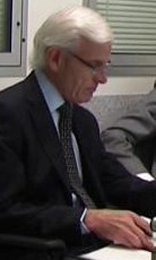 The Coroners Court in Melbourne is the first in the world to hold an inquest into the MH17 crash on July 17, 2014, and the cause of death of those on board. Iain West (right), the deputy state coroner presided, after the state coroner, Judge Ian Gray, withdrew at the last minute. The inquest opened for a single hour of hearing on Tuesday. A second hearing is scheduled for Wednesday, when West will announce his findings. In the UK, where an investigation into the death of 10 British nationals, is being supervised by Leicestershire coroner, Catherine Mason, all court proceedings have been suspended without a date being set for
The Coroners Court in Melbourne is the first in the world to hold an inquest into the MH17 crash on July 17, 2014, and the cause of death of those on board. Iain West (right), the deputy state coroner presided, after the state coroner, Judge Ian Gray, withdrew at the last minute. The inquest opened for a single hour of hearing on Tuesday. A second hearing is scheduled for Wednesday, when West will announce his findings. In the UK, where an investigation into the death of 10 British nationals, is being supervised by Leicestershire coroner, Catherine Mason, all court proceedings have been suspended without a date being set for 
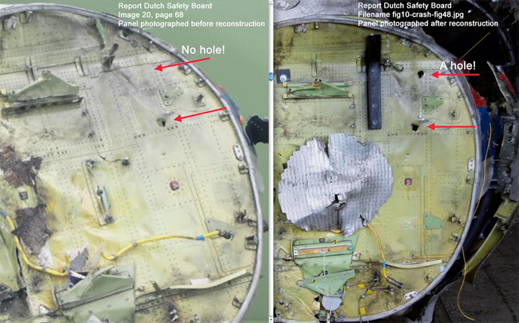





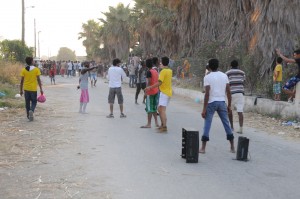
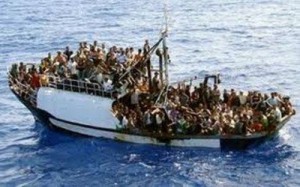

 In terms of today’s devastating terrorist conclave presently based in Syria and Turkey, readers should note that GLADIO’s ‘stay behind operation’ also laid stakes down in Turkey. When considering the sheer number of rival jihadist and ‘rebel’ gangs, and counter gangs operating in this region right now, it’s not difficult to recognize a common design to this all too familiar mayhem, as well as its real architects. Aangirfan adds:
In terms of today’s devastating terrorist conclave presently based in Syria and Turkey, readers should note that GLADIO’s ‘stay behind operation’ also laid stakes down in Turkey. When considering the sheer number of rival jihadist and ‘rebel’ gangs, and counter gangs operating in this region right now, it’s not difficult to recognize a common design to this all too familiar mayhem, as well as its real architects. Aangirfan adds: